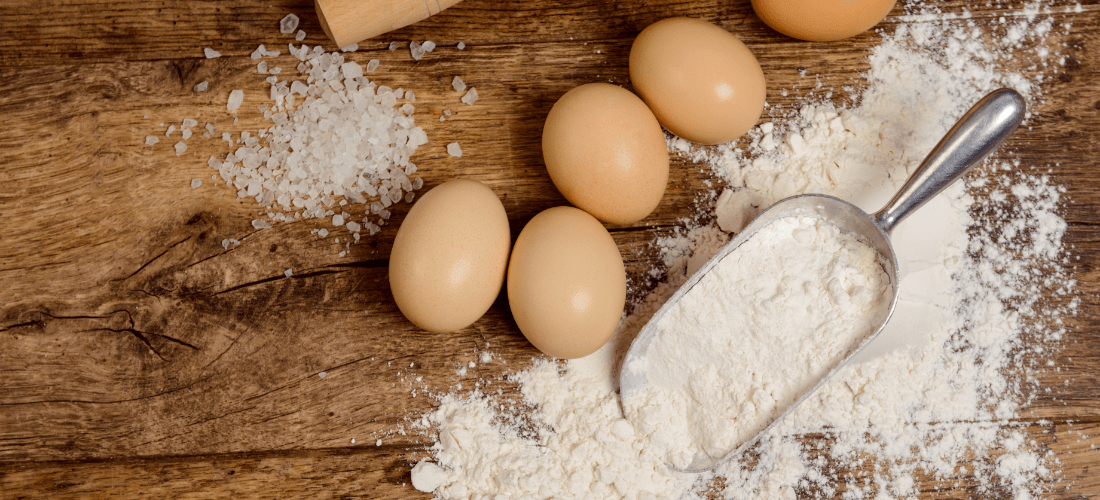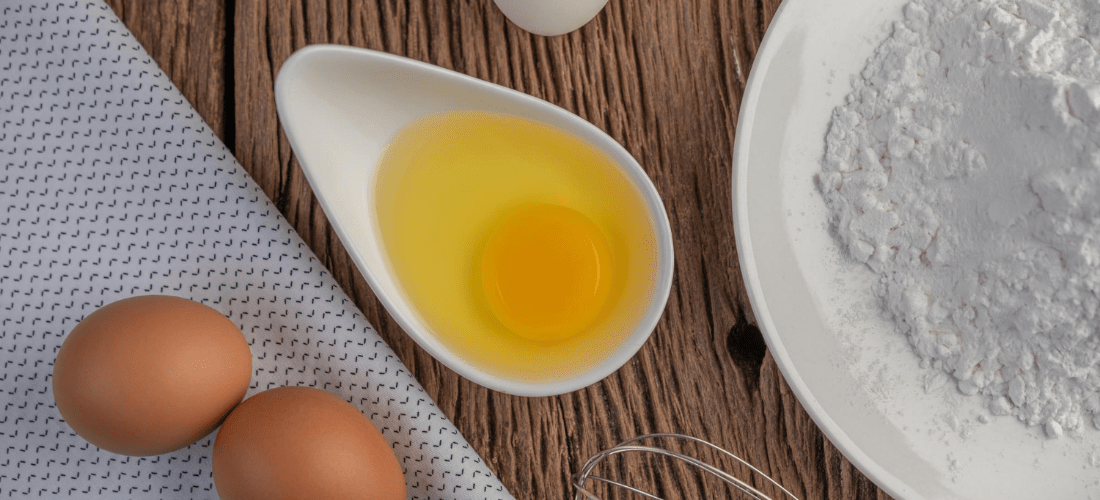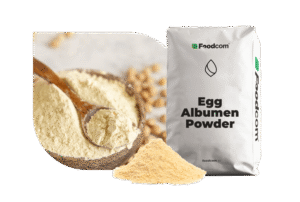Egg powder has been an important element in the supply chain of the food, pharmaceutical and feed industries for many years. Modern processing methods, such as pasteurisation and spray drying, transform traditional liquid eggs into a durable and easy-to-use raw material. Powdered eggs retain most of the natural characteristics of fresh eggs, while eliminating many of the problems associated with storage, transport and microbiological safety.
How is egg powder produced?
The production process begins with the selection and breaking of fresh chicken eggs. The egg mass is then pasteurised, which eliminates microorganisms and improves product safety. The next stage is spray drying, which reduces the moisture content to approx. 3-5%. This makes the egg powder a durable raw material that is resistant to the growth of microorganisms.
Egg products prepared in this way take the form of a homogeneous powder that flows freely, free of impurities and lumps. The colour depends on the type of raw material used – from light yellow to intense orange.
Properties and technological advantages
The most important properties of this type of raw material are:
- long shelf life,
- microbiological safety,
- high protein and fat content,
- ease of dosing and transport,no need for refrigerated storage.
As a result, egg powder is widely used in many industries where stable quality parameters and safety are important.
Types of egg powder
There are several types of egg powder available on the market, including:
- whole egg powder – the most versatile, used in baking, pasta and instant food production, among other things,
- egg white powder – a valuable protein concentrate used in the production of protein bars, dietary supplements and functional foods,
- egg yolk powder – an additive used in mayonnaise, sauces and delicatessen products due to its fat content and natural emulsifiers,
- thermostable powdered egg yolk – a specialised product that retains its emulsifying properties even during heat treatment, making it suitable for use in the production of sauces and products requiring pasteurisation.
Egg powder – applications in various industries
Although most people associate eggs primarily with cooking, egg powder plays a much broader role. It is used, among others, in:
- the food industry – production of pasta, confectionery, instant desserts, mayonnaise and sauces,
- functional and sports foods – it is a source of easily digestible protein, used in nutritional supplements and protein snacks,
- pharmaceuticals and supplements – as a carrier of active substances, an ingredient in fortifying preparations,
- animal feed – it supplements the nutritional value of feed mixtures.
In each of these areas, microbiological stability, ease of dosing and standardised quality are important.
Application – where to order proven products?
When choosing a supplier, several important factors must be taken into account:
- quality certificates (e.g. HACCP, ISO, BRC),
- control of raw materials at every stage of production,
- the ability to tailor the type of product to the specific needs of the plant,
- timely deliveries and technical support.
Professional manufacturers supply egg powder in various variants and weights, enabling its use in both large plants and smaller specialist companies.
Egg powder and sustainable production and market innovation
The growing importance of egg powder in industry is also due to increasing demands for sustainability and production efficiency. Dried egg products help to reduce food waste as they have a much longer shelf life than fresh eggs. Their compact form also reduces storage space requirements and lowers transport costs and carbon footprint.
What is more, powdered eggs allow for consistent quality of raw materials throughout the year, regardless of seasonal fluctuations in the supply of fresh eggs. This is a huge advantage in industries that require stable production parameters and repeatable recipes. In addition, the ability to easily dose and mix different variants, such as whole egg powder or thermostable egg yolk powder, allows for the creation of innovative recipes that respond to changing market needs. In this way, powdered egg products become not only a practical but also a strategic solution in the modern food and pharmaceutical industries.
Why choose powdered products?
The industry is keen to use dry egg because it is stable, convenient and reduces logistics costs. Unlike fresh eggs, powder does not require refrigeration or special transport conditions. This reduces the risk of losses due to short shelf life or mechanical damage to the shells.
In addition, egg powder makes it easy to standardise recipes and precisely measure ingredients, which is particularly important in large-scale industrial production.
Egg powder – the secret to efficiency and safety in production
Egg powder is not only an alternative to fresh eggs, but above all a modern technological raw material with many applications. Thanks to a variety of variants – from classic whole egg powder, through powdered egg white and yolk, to specialised thermostable forms – it is possible to tailor the product to the specific needs of the industry.
Long-term stability, microbiological safety and convenient storage make egg powder suitable for use in many industries, from food to pharmaceuticals. Choosing a proven supplier guarantees that the raw material will meet the highest quality and safety standards.








